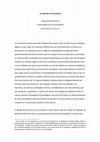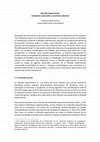Drafts by Antonio Gaitán Torres

En este capítulo prestaremos atención a la psicología de las emociones políticas. El objetivo es ... more En este capítulo prestaremos atención a la psicología de las emociones políticas. El objetivo es ofrecer un marco que integre la evidencia más relevante en este ámbito, ofreciendo al mismo tiempo un mapa que resulte útil para quien estudia las emociones desde la filosofía política, la ética o la teoría crítica y cultural. El mensaje central de este capítulo es que el estudio de las emociones debe ir en conjunción con una mejor comprensión de las dinámicas de interacción y participación política. Frente a modelos individualistas, en épocas recientes hemos empezado a entender que la interacción política se analiza de manera más ajustada desde una visión más social o grupal. Este cambio de paradigma tiene importantes consecuencias para la comprensión de la psicología de nuestras emociones políticas y para las soluciones y medidas de intervención encaminadas a minimizar sus efectos negativos

Los incentivos forman parte del mobiliario de nuestra vida. Cuando se quiere obligar a alguien a ... more Los incentivos forman parte del mobiliario de nuestra vida. Cuando se quiere obligar a alguien a hacer algo, los incentivos facilitan una vía intermedia entre la fuerza y la persuasión. Los incentivos le dan al agente la posibilidad de escoger de forma aparentemente voluntaria acciones que no escogería sin esa ayuda extra, orientando su conducta hacia resultados que resultan beneficiosos para todos. Para mucha gente resulta muy cómodo coger el coche por la mañana sin demasiada preocupación. Pero si con el objetivo de reducir las emisiones, los carriles rápidos en nuestras ciudades se reservan para vehículos con al menos dos ocupantes, esta norma facilita un incentivo para coger el bus o para buscar un acompañante de camino al trabajo. Este es solo un ejemplo de los muchos y variados incentivos que encontramos en nuestra vida diaria. Pero hay muchos más. En algunos debates recientes sobre la obligatoriedad de las vacunas contra el coronavirus, por ejemplo, muchas voces han apelado a los incentivos, en diversas variedades y formas, concibiéndolos como herramientas que nos ayudarían a 'gestionar' o 'vencer' las reticencias de algunos ciudadanos ante las nuevas vacunas. El pasaporte inmunológico, que permitiría viajar con libertad después de estar vacunados (y que ahora mismo se discute en muchos países), sería en última instancia un incentivo para acelerar la vacunación. El debate ético en torno a los incentivos, como vemos, está en la calle. Sin embargo, el debate filosófico en torno a estos peculiares mecanismos de gestión e intervención 1 Este escrito se ha redactado en el marco del Proyecto de Investigación 'Epistemología política y patologías del conocimiento-EPISTEPOC', FFI2019/00397/001, financiado por el Ministerio de Ciencia y Universidades. También ha recibido financiación desde la Red de Excelencia 'APPLY-Nuevas tendencias de la filosofía aplicada. De la filosofía teórica a los nuevos retos de la sociedad', (RED2018-102-695-T), financiada por el Ministerio de Ciencia y Universidades.
Books by Antonio Gaitán Torres
Cátedra - Teorema Serie Mayor, 2020
Cátedra - Teorema Serie Mayor, 2020
Reservados todos los derechos. El contenido de esta obra está protegido por la Ley, que establece... more Reservados todos los derechos. El contenido de esta obra está protegido por la Ley, que establece penas de prisión y/o multas, además de las correspondientes indemnizaciones por daños y perjuicios, para quienes reprodujeren, plagiaren, distribuyeren o comunicaren públicamente, en todo o en parte, una obra literaria, artística o científica, o su transformación, interpretación o ejecución artística fijada en cualquier tipo de soporte o comunicada a través de cualquier medio, sin la preceptiva autorización.
papers by Antonio Gaitán Torres

Quaderns de Filosofía, 2024
El obje8vo de este ar9culo es presentar una panorámica del desarrollo y de los enfoques más influ... more El obje8vo de este ar9culo es presentar una panorámica del desarrollo y de los enfoques más influyentes dentro de la filosoCa experimental. En la primera sección se introduce el compromiso central de la filosoCa experimental, situando ese compromiso dentro de dos grandes narra8vas sobre su origen como disciplina. En la segunda sección se exploran los dos programas que han sido históricamente más influyentes dentro de la filosoCa experimental. En esta sección se describe cómo esos dos programas han dejado paso a un enfoque metodológico más híbrido, que enmarca gran parte de lo que actualmente se en8ende como filosoCa experimental. La filosoCa experimental ha estado siempre acompañada de polémica, tanto desde la filosoCa como desde aquellas disciplinas no filosóficas que han nutrido su metodología. En la sección tercera se pasa revista a las objeciones más influyentes contra la filosoCa experimental. La sección cuarta se ocupa de algunos desarrollos recientes de la filosoCa experimental, remarcando la pluralidad de temas y enfoques metodológicos que caracteriza a la filosoCa experimental en la actualidad. La úl8ma sección sinte8za las aportaciones más importantes de esta panorámica. 1 Este ar(culo se ha beneficiado de la financiación de los siguientes proyectos de inves8gación: Metaprodes (Meta-ac8tudes, desacuerdos profundos y progreso moral -PID2021-124152NB-I00 -Agencia Estatal de Inves8gación); digi_morals (Los desacuerdos morales en la esfera digital: dinámicas interac8vas, micro-mecanismos y marcadores culturales -Fundación BBVA, Proyectos de Inves8gación Cien(fica 2022-24).

For scientific theories grounded in empirical data, replicability is a core principle, for at lea... more For scientific theories grounded in empirical data, replicability is a core principle, for at least two reasons. First, unless we accept to have scientific theories rest on the authority of a small number of researchers, empirical studies should be replicable, in the sense that its methods and procedure should be detailed enough for someone else to conduct the same study. Second, for empirical results to provide a solid foundation for scientific theorizing, they should also be replicable, in the sense that most attempts at replicating the original study that produced them would yield similar results. The XPhi Replicability Project is primarily concerned with replicability in the second sense, that is: the replicability of results. In the past year, several projects have shed doubt on the replicability of key findings in psychology, and most notably social psychology. Because the methods of experimental philosophy have often been close to the ones used in social psychology, it is onl...
Behavioral and Brain Sciences, 2018
Although we are sensitive to the advantages of reactive attitudes as a starting point, we are con... more Although we are sensitive to the advantages of reactive attitudes as a starting point, we are concerned that confusion on the level of analysis can easily plague this type of account. We argue that what is needed here is a serious appraisal of the effects on the promotion of values of moralistic responses toward different types of agency.

Critica-revista Hispanoamericana De Filosofia, 2009
El libro que comentaré a continuación compila doce artículos de Michael Bratman publicados entre ... more El libro que comentaré a continuación compila doce artículos de Michael Bratman publicados entre el año 2000 y el 2005. Los artículos giran en torno a aquellas estructuras psicológicas que subyacen a nuestra autonomía personal. La función de nuestros juicios evaluativos a la hora de posibilitar esa peculiar capacidad y el estatus teórico de la propuesta de Bratman son los otros dos bloques temáticos que unifican el material contenido en este libro. Todos los artículos compilados aquí presuponen distinciones conceptuales elaboradas por Bratman en libros anteriores. 1 La novedad, sin embargo, es que Bratman aplica esas distinciones a los tópicos que acabo de mencionar, desarrollando una teoría compleja y sugerente sobre el valor de nuestra autonomía dentro de un marco explicativo naturalista. El plan de esta nota crítica es el siguiente: en la sección 1 esbozo los contornos que enmarcan gran parte del debate reciente en torno a nuestro concepto de "autonomía personal". Asumido esto, la sección 2 expone los aspectos más generales de la teoría de la intención defendida por Bratman en Intentions, Plans, and Practical Reasons (1987/1999). Allí explico en qué sentido algunas de las distinciones adelantadas en este libro permiten a Bratman modelar una determinada imagen del sujeto autónomo. La sección 3, finalmente, presenta una objeción contra este modelo de autonomía.
Viciana, Gaitán & Aguiar (eds.). Experiments in Moral and Political Philosophy, Routledge, 2023
The purpose of this introductory chapter is to provide a quick overview
of the field of experime... more The purpose of this introductory chapter is to provide a quick overview
of the field of experimental moral and political philosophy. This chapter
should be useful both for readers approaching this active area of research for
the first time and for experts who want to reflect on the state of the field or
simply to get a glimpse of what is currently being done. In line with this goal,
in this introduction, we will combine a review of already well-established
developments and findings with more controversial issues and positions,
some of which are still subject to debate or negotiation within the field.
Experimental Ethics
The aim of this chapter is twofold: Firstly, we will defend that an experimental philosophy which... more The aim of this chapter is twofold: Firstly, we will defend that an experimental philosophy which is methodologically sensitive to the dual nature of our conceptual competence (linguistic responses and behavioral manifestations) should look at itself in the mirror of experimental economics. Secondly, we will argue that moving experimental ethics closer to the methodology of experimental economics is the first step to experimentally examine actual choice processes, processes that can be described in terms of reflective equilibrium. The framework offered by reflective equilibrium, we will argue, is more faithful to the complex nature of our real decisions than the simple intuitions of the hypothetical scenarios used by philosophers or the responses to questionnaires and vignettes that are common in experimental philosophy.
Crítica (México D. F. En línea), 2005
Este artículo presenta una alternativa a la dicotomía entre razones motivacionales y razones norm... more Este artículo presenta una alternativa a la dicotomía entre razones motivacionales y razones normativas. En Practical Reality (PR), Dancy mantiene que ambas razones se identifican con estados externos al agente —"tesis de la identidad" (TI)—. Hay dos argumentos en PR a favor de la TI: El primero se basa en una interpretación externista del significado de "tener una razón". El segundo presenta una vía indirecta, defendiendo que las adscripciones de razones según estados psicológicos internos no son casos centrales en las explicaciones normativas. Estas dos críticas ignorarían una fuerte intuición normativa: el "acceso epistémico". Si ésta es persuasiva, los estados internos no pueden ser eliminables.
Teorema, Vol XLV/1, pp. 113-125 , 2022
Cuadernos de Trabajo Social
Review of Philosophy and Psychology

PLOS ONE, 2019
Rising hostility between members of opposing political factions has gained considerable attention... more Rising hostility between members of opposing political factions has gained considerable attention in both academic and popular press. The adverse effects of this phenomenon are widely recognized, but its psychological antecedents remain the focus of ongoing debate in political psychology. Past research has honed in on two conflicting explanations: one highlights the extent to which people self-define as supporters of particular parties or candidates (the identity view), and another points toward the intensity with which they disagree on substantive matters of policy (the issues view). A nationally representative survey of 1051 eligible Spanish voters yielded support for both explanations. The perceived magnitude and nature of disagreement were associated with increased partisan prejudice, while controlling for partisan identification. Path analyses revealed that issue-based prejudice was more pronounced among ideologically extreme agents (β = 0.237, 95% CI [0.174, 0.300]) than toward extreme targets (β = 0.140, 95% CI [0.078, 0.201]), and replicated recent findings that identity-based prejudice is motivated primarily by non-instrumental factors (β = 0.286, 95% CI [0.230, 0.337]). Together, these results indicate that discrimination across party lines responds to two fundamentally distinct, though at times co-occurring, imperatives: to coalesce in ideologically homogeneous communities, and to protect one's sense of partisan identity.
Review of Philosophy and Psychology, 2021
Responding to recent concerns about the reliability of the published literature in psychology and... more Responding to recent concerns about the reliability of the published literature in psychology and other disciplines, we formed the X-Phi Replicability Project (XRP) to estimate the reproducibility of experimental philosophy (osf.io/dvkpr). Drawing on a representative sample of 40 x-phi studies published between 2003 and 2015, we enlisted 20 research teams across 8 countries to conduct a high-quality replication of each study in order to compare the results to the original published findings. We found that x-phi studies – as represented in our sample – successfully replicated about 70% of the time. We discuss possible reasons for this relatively high replication rate in the field of experimental philosophy and offer suggestions for best research practices going forward.

Behavioral and Brain Sciences, 2018
Does it make sense for people to hold one another responsible for what they do, as happens in cou... more Does it make sense for people to hold one another responsible for what they do, as happens in countless social interactions every day? One of the most unsettling lessons from recent psychological research is that people are routinely mistaken about the origins of their behavior. Yet philosophical orthodoxy holds that the exercise of morally responsible agency typically requires accurate self-awareness. If the orthodoxy is right, and the psychology is to be believed, people characteristically fail to meet the standards of morally responsible agency, and we are faced with the possibility of skepticism about agency. Unlike many philosophers, I accept the unsettling lesson from psychology. I insist, however, that we are not driven to skepticism. Instead, we should reject the requirement of accurate self-awareness for morally responsible agency. In Talking to Our Selves I develop a dialogic theory, where the exercise of morally responsible agency emerges through a collaborative conversational process by which human beings, although afflicted with a remarkable degree of self-ignorance, are able to realize their values in their lives.

Ethical Theory and Moral Practice, 2018
Bernard Williams proposed his relativism of distance based on the recognition " that others are a... more Bernard Williams proposed his relativism of distance based on the recognition " that others are at varying distances from us ". Recent work in moral psychology and experimental philosophy highlights the prevalence of folk relativism in relation to spatial and temporal distance. However, Williams' relativism of distance as well as recent empirical findings which seem to support some of Williams' main ideas on this issue have received scant attention. In this article, we would like to focus on the phenomenon of moral relativism regarding spatiotemporal distance as an entry point to the nature of folk moral relativism and the methodology of meta-ethics. To do so, we first introduce Williams' relativism of distance. Then we compare Williams' approach on this matter to recent experimental approaches on folk relativism. On this score the main result is that Williams' proposal is consistent with several well-established insights on the experimental study of folk relativism. Williams' relativism of distance is not only empirically plausible, but it is also of relevance for shaping the methodology of an empirically informed meta-ethics. We close this paper by stressing this methodological contribution.

Cuadernos de Trabajo Social
En este artículo se ofrece una caracterización de la integridad profesional, y de algunos de los ... more En este artículo se ofrece una caracterización de la integridad profesional, y de algunos de los dilemas que se le plantean al trabajador social en su práctica cotidiana, a partir de una caracterización formal de nuestros juicios morales. Se asume, en el citado texto, que un trabajo previo de clarificación conceptual —eminentemente filosófico y centrado en el tipo de razones que sustentan nuestros juicios morales— podría ser de ayuda a la hora de analizar conflictos y dilemas profesionales típicos. Asumiendo que cualquier dominio profesional debería prestar atención a aquellos datos científicos que serían re-levantes para explicar la labor que se desarrolla dentro del dominio en cuestión, este comentario explora las con-secuencias que para la ética profesional tendría una caracterización filosófica de nuestra capacidad moral que sea «empíricamente informada». Se defenderá en este comentario que esta información empírica debería modular de modo importante las demandas a las que el profesional está sujeto y seguramente también debería llevarnos a re-pensar los mecanismos institucionales que podrían reforzar una correcta práctica profesional. Palabras clave: Ética normativa; meta-ética; razones; intuiciones morales
Behavioral and Brain Sciences
Although we are sensitive to the advantages of reactive attitudes as a starting point, we are con... more Although we are sensitive to the advantages of reactive attitudes as a starting point, we are concerned that confusion on the level of analysis can easily plague this type of account. We defend that what is needed here is a serious appraisal of the effects on the promotion of values of moralistic responses towards different types of agency.











Uploads
Drafts by Antonio Gaitán Torres
Books by Antonio Gaitán Torres
papers by Antonio Gaitán Torres
of the field of experimental moral and political philosophy. This chapter
should be useful both for readers approaching this active area of research for
the first time and for experts who want to reflect on the state of the field or
simply to get a glimpse of what is currently being done. In line with this goal,
in this introduction, we will combine a review of already well-established
developments and findings with more controversial issues and positions,
some of which are still subject to debate or negotiation within the field.
of the field of experimental moral and political philosophy. This chapter
should be useful both for readers approaching this active area of research for
the first time and for experts who want to reflect on the state of the field or
simply to get a glimpse of what is currently being done. In line with this goal,
in this introduction, we will combine a review of already well-established
developments and findings with more controversial issues and positions,
some of which are still subject to debate or negotiation within the field.
(Kauppinen 2005). According to Kauppinen, experimental philosophy (in any of its possible formulations) would not be able to identify the robust conceptual intuitions of speakers. In this chapter, we counter Kauppinen’s criticism by highlighting the relevance of experimental
economics to identify the behavioral dimension of our conceptual competence. To the extent that experimental economics is particularly well equipped to identify the behavioral aspect of our conceptual competence, experimental ethics would do well in enriching its methodology (based on questionnaires and vignettes, and an overly linguistic bias) with behaviorallyoriented experiments. This would permit us to more clearly define the contours of our conceptual competence in the contexts that are relevant for our discussion - attribution of moral responsibility, fairness, etc. Importantly, experimental work on this behavioral dimension of our conceptual competence will also contribute to experimentally modeling processes of reflective equilibrium that would justify our principles and normative standards.
The message of this chapter is therefore twofold: Firstly, we will defend that an experimental philosophy which is methodologically sensitive to the dual nature of our conceptual competence (linguistic responses and behavioral manifestations) should look at itself in the mirror of experimental economics. Secondly, we will argue that moving
experimental ethics closer to the methodology of experimental economics is the first step to experimentally examine actual choice processes, processes that can be described in terms of
reflective equilibrium. The framework offered by reflective equilibrium, we will argue, is more faithful to the complex nature of our real decisions than the simple intuitions of the hypothetical scenarios used by philosophers or the responses to questionnaires and vignettes
that are common in experimental philosophy.